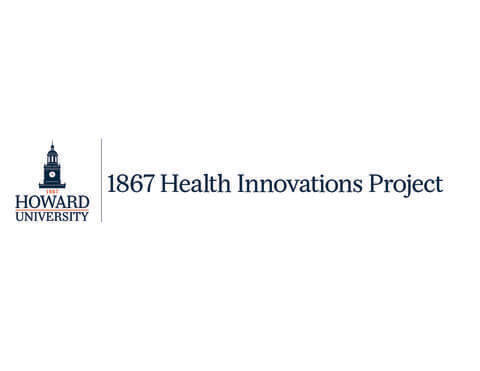1867 Health Innovations Project
Howard University Launches 1867 Health Innovations Project
Project will use Technology to Transform Medical Care for Vulnerable Populations
WASHINGTON (April 30, 2020) – The Howard University College of Medicine has launched a
new, cutting-edge technology and innovation program with a goal to transform and improve health care in medically underserved communities. Aptly named after the year Howard University was founded, the 1867 Health Innovations Project will collaborate with medical researchers, innovators, entrepreneurs, and corporate partners to tackle complex health challenges confronting underserved populations in the Washington, D.C. area.
“The critical gap related to life expectancy, chronic disease, and access to technology is an unacceptable reality,” said Michael Crawford, Howard University associate dean for Strategy, Outreach, and Innovation. “1867 is set to play a pivotal role by augmenting faculty and student’s training, research, and understanding of disruptive solutions.”
A recent study by the Health Inequality Project indicated the life expectancy gap between affluent and poor communities in the U.S. is approximately 15 years. However, in two District of Columbia
neighborhoods, a related study revealed a larger disparity. The wealthy Georgetown section of D.C. has a life expectancy of 94 years, compared to the city’s Trinidad neighborhood (located a few miles east in Ward 5), which has a life expectancy of 64 years. The COVID-19 pandemic amplifies the health disparities that exist in the United States.
“There are many organizations working diligently to improve population health and health disparities throughout the U.S.,” said Dr. Hugh Mighty, Howard University College of Medicine dean and vice president of Clinical Affairs. “Our goal is to establish 1867 as a center of digital health innovation, technology development, and research in addressing medical challenges confronting the most vulnerable populations.”
1867 will prioritize cutting technology solutions to vastly improve patient access, population health, care coordination, patient and family engagement, and value-based payment models. The program will also empower patients and users to participate in a process that effectively aligns technology with their care need, while facilitating the adoption of disruptive technologies in chronic disease management and medically underserved communities.
“The 1867 innovation program appropriately aligns with Howard University’s longstanding commitment of providing advanced care to underserved communities,” said Anthony K. Wutoh,
Howard University provost and chief academic officer. “We are fully vested and uniquely positioned to address the myriad of issues that poor communities face each day.”
For more information about 1867 Health Innovation Project, contact Michael Crawford at michael.crawford@howard.edu
###
About Howard University
Founded in 1867, Howard University is a private, research university that is comprised of 13 schools and colleges. Students pursue studies in more than 120 areas leading to undergraduate, graduate and professional degrees. The University operates with a commitment to Excellence in Truth and Service and has produced one Schwarzman Scholar, three Marshall Scholars, four Rhodes Scholars, 11 Truman Scholars, 25 Pickering Fellows and more than 70 Fulbright Scholars. Howard also produces more on-campus African-American Ph.D. recipients than any other university in the United States.
For more information on Howard University, visit www.howard.edu.
For media inquiries contact: Sholnn Freeman, sholnn.freeman@howard.edu

